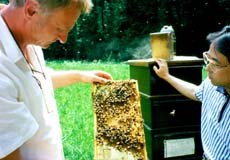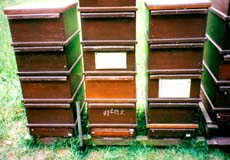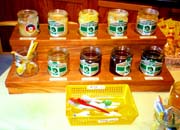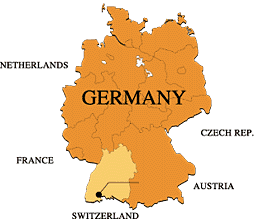|
My Encounter with a Stubborn Meister
 The day after I visited the Munstertal Apiculture Museum, I went to see an apiculturist, Mr. Roland Hessler. He owns a bee farm with about 200 colonies of honeybees in the Black Forrest not far from the border of Switzerland. He is a "Meister" (master) of apiculture, who produces and sells honey there. "Meister" is a very honorable title, just like titles given to aristocrats and doctors. Meister is a very important title for apiculturists because a bee farm is required to have a Meister, not only to employ trainees, but also to do many other important things. To take the examination to be a Meister, one must complete 3 years of professional training at an educational facility, and then 3 more years of on-the-job training at a bee farm. Becoming a Meister is so difficult that the people who pass the examination are allowed to put the title "Meister" before their names, just like the title "Doctor." Therefore, I should call him Meister Hessler instead of just Mr. Hessler. He has a reputation as a "headstrong Meister" among his apiculture colleges, but somehow I hit it off with him. He told me about his personal history as an apiculturist and the problems that the German apiculture industry is presently facing. The day after I visited the Munstertal Apiculture Museum, I went to see an apiculturist, Mr. Roland Hessler. He owns a bee farm with about 200 colonies of honeybees in the Black Forrest not far from the border of Switzerland. He is a "Meister" (master) of apiculture, who produces and sells honey there. "Meister" is a very honorable title, just like titles given to aristocrats and doctors. Meister is a very important title for apiculturists because a bee farm is required to have a Meister, not only to employ trainees, but also to do many other important things. To take the examination to be a Meister, one must complete 3 years of professional training at an educational facility, and then 3 more years of on-the-job training at a bee farm. Becoming a Meister is so difficult that the people who pass the examination are allowed to put the title "Meister" before their names, just like the title "Doctor." Therefore, I should call him Meister Hessler instead of just Mr. Hessler. He has a reputation as a "headstrong Meister" among his apiculture colleges, but somehow I hit it off with him. He told me about his personal history as an apiculturist and the problems that the German apiculture industry is presently facing.
"My family has been engaged in apiculture since my grandfather's generation. I'm the third generation owner of the bee farm. My grandfather used to own a bee farm with 800 colonies of bees in South Africa. However, my father sold the farm and our bee farm there isn't any more. When I started the management of our bee farm, I was thinking of selling honey through a trading company. However, I ended up doing it on my own and have continued the self-production and sales system since 1966."
Various Problems that German Apiculture Is Facing
 In fact, agriculture is now standing at the crossroads. One of the issues is economic independence. What he told me on this matter was this: In fact, agriculture is now standing at the crossroads. One of the issues is economic independence. What he told me on this matter was this:
"In Germany, the number of farmers, and above all apiculturists, is decreasing. I regret that honeybees are also decreasing. In Europe in general, unqualified weight is placed on industry, and the pay keeps being raised only in industrial areas. Agriculture cannot sustain itself without financial support from the government. In these circumstances, one thing we can do is to produce and sell products on our own, which means we can keep the products' prices low without any in-between distribution processes. But this is not something every farm can do. Farmers who cannot apply this system are having a very difficult time."
Intrinsically, human beings are supported by agriculture. Therefore, it is wrong to pursue only economic efficiency, and agriculture should be considered in a different perspective than the economic efficiency of other industries. The unification process in Europe, especially that of the EU in recent years, is said to have dealt a severe blow to the German apiculture industry.
"Germany has the strictest food laws in Europe, and honey is under its control along with other food products. German consumers and producers of these products want their standards to be implemented as EU standards, however, the EU is opposed to this. This opposition is not from consumers or producers of products, but from the "vicious structure" of society, as I put it. We are fighting against this "vicious structure," but things don't seem to be getting better. However, we still have hope. In 1997, The European Confederation of Professional Apiculture was established. Its common goal is to provide consumers with high quality products. Apiculturists in all the member countries agree on this common goal."
The standards of food production should be decided, not from the standpoint of the promotion of the economy and industry, but from the standpoint of consumers and producers. This is why I think the strict standards of Germany should be adopted by other EU member nations. The self-sustenance rate of honey is around 10%, both in Germany and Japan. In order to stay competitive with low-priced imported honey, it's necessary for German and Japanese apiculturists to raise quality standards for their products. Also for this reason, I believe that the strict standards of Germany, which I learned on this trip, as well as the apiculturists' uncompromising attitudes towards their products, will raise the product value. This will eventually lead to some profit for consumers as well as producers.
 Lastly I told him about my dream.
Lastly I told him about my dream.
"I'd like to make a sightseeing bee farm in a big forest so that anybody can easily drop in. I 'd like to show visitors how we keep and raise honeybees, and I'm also planning to make a honey and bee museum on the farm."
"That's a wonderful idea."
As he listened to my dream, "Meister" Roland Hessler deeply nodded with a smile. |




 The day after I visited the Munstertal Apiculture Museum, I went to see an apiculturist, Mr. Roland Hessler. He owns a bee farm with about 200 colonies of honeybees in the Black Forrest not far from the border of Switzerland. He is a "Meister" (master) of apiculture, who produces and sells honey there. "Meister" is a very honorable title, just like titles given to aristocrats and doctors. Meister is a very important title for apiculturists because a bee farm is required to have a Meister, not only to employ trainees, but also to do many other important things. To take the examination to be a Meister, one must complete 3 years of professional training at an educational facility, and then 3 more years of on-the-job training at a bee farm. Becoming a Meister is so difficult that the people who pass the examination are allowed to put the title "Meister" before their names, just like the title "Doctor." Therefore, I should call him Meister Hessler instead of just Mr. Hessler. He has a reputation as a "headstrong Meister" among his apiculture colleges, but somehow I hit it off with him. He told me about his personal history as an apiculturist and the problems that the German apiculture industry is presently facing.
The day after I visited the Munstertal Apiculture Museum, I went to see an apiculturist, Mr. Roland Hessler. He owns a bee farm with about 200 colonies of honeybees in the Black Forrest not far from the border of Switzerland. He is a "Meister" (master) of apiculture, who produces and sells honey there. "Meister" is a very honorable title, just like titles given to aristocrats and doctors. Meister is a very important title for apiculturists because a bee farm is required to have a Meister, not only to employ trainees, but also to do many other important things. To take the examination to be a Meister, one must complete 3 years of professional training at an educational facility, and then 3 more years of on-the-job training at a bee farm. Becoming a Meister is so difficult that the people who pass the examination are allowed to put the title "Meister" before their names, just like the title "Doctor." Therefore, I should call him Meister Hessler instead of just Mr. Hessler. He has a reputation as a "headstrong Meister" among his apiculture colleges, but somehow I hit it off with him. He told me about his personal history as an apiculturist and the problems that the German apiculture industry is presently facing. In fact, agriculture is now standing at the crossroads. One of the issues is economic independence. What he told me on this matter was this:
In fact, agriculture is now standing at the crossroads. One of the issues is economic independence. What he told me on this matter was this: Lastly I told him about my dream.
Lastly I told him about my dream.